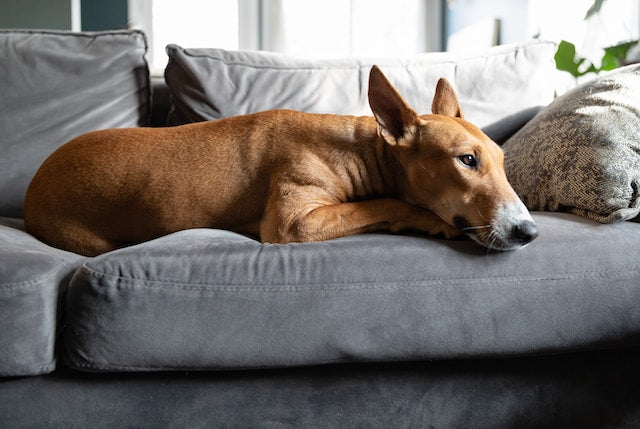A. Brief Overview of Dog Anxiety
Anxiety in dogs is a common concern for pet owners across the UK. Like humans, dogs experience anxiety, which can manifest in various ways, often impacting their behaviour and overall wellbeing. Understanding the root causes and symptoms of canine anxiety is crucial in providing the right support and care.
B. Importance of Calming Treats
Calming treats have emerged as a popular and natural solution for managing anxiety in dogs. These treats are designed to help soothe and relax your pet, making them an essential tool for dog owners. In this article, we'll delve into how calming treats can make a significant difference in your dog's life, especially for those prone to anxiety.
C. Purpose of the Article
The purpose of this article is to provide comprehensive insight into canine anxiety and the role of calming treats in alleviating stress in dogs. We'll explore the types of anxiety dogs face, the benefits of calming treats, and how to choose the right ones for your furry friend. Our goal is to guide you through creating a more peaceful and happy life for your dog.
II. Understanding Canine Anxiety
A. Types of Dog Anxiety
Separation Anxiety: One of the most prevalent forms of anxiety in dogs, separation anxiety occurs when a dog becomes distressed due to being separated from their owner or primary caregiver. This can lead to destructive behaviour, excessive barking, and other signs of distress.
Noise Phobia: Dogs often become anxious in response to loud or unfamiliar noises such as thunderstorms, fireworks, or traffic. This type of anxiety can cause panic and fear in dogs, leading to behaviours like hiding or attempting to escape.
Generalised Anxiety: Some dogs may suffer from generalised anxiety, where they display constant signs of anxiety without a specific trigger. This might stem from past experiences, genetics, or environmental factors.
B. Recognizing Symptoms
Identifying the symptoms of anxiety in dogs is key to providing timely and effective care. Common signs include excessive barking, panting, trembling, pacing, destructive behaviour, and sudden aggression. It's important to observe your dog's behaviour closely and consult a vet if you notice any changes.
C. Impact of Anxiety on Dogs
Anxiety can have a profound impact on a dog's physical and mental health. Chronic stress can lead to a weakened immune system, digestive issues, and behavioural problems. It's not just about immediate reactions; long-term anxiety can significantly affect a dog's quality of life.
III. The Role of Calming Treats
A. What Are Calming Treats?
Calming treats are specially formulated snacks for dogs that help alleviate stress and anxiety. They often contain natural ingredients like chamomile, valerian root, and L-tryptophan, which are known for their soothing properties. These treats offer a non-pharmaceutical approach to managing canine anxiety.
B. How Do They Work?
Calming treats work by inducing a sense of relaxation in dogs. The active ingredients interact with the dog's nervous system, promoting calmness without causing drowsiness. This makes them ideal for use in situations that may induce anxiety, such as during thunderstorms or when left alone.
C. Benefits of Calming Treats
Reduced Stress Levels: Calming treats can significantly reduce the symptoms of anxiety, helping dogs feel more at ease in potentially stressful situations.
Improved Behaviour: By alleviating anxiety, these treats can help curb unwanted behaviours like excessive barking, destructive chewing, and aggression.
Enhanced Well-being: Regular use of calming treats can improve a dog's overall mood and wellbeing, leading to a happier, more content pet.
IV. Choosing the Right Calming Treats
A. Importance of Natural Ingredients
When it comes to calming treats, the choice of ingredients is paramount. Pupps prioritises natural ingredients, ensuring that each treat is not only effective in calming your dog but also safe and healthy for their overall wellbeing.
B. Key Ingredients in Pupps' Calming Treats and Their Benefits
Chamomile: Known for its soothing properties, chamomile helps in reducing stress and promoting relaxation in dogs. It's a gentle, natural sedative that can help ease anxiety.
Valerian Root: This herb is renowned for its calming effect on the nervous system. It's particularly effective in managing stress-related behaviours in dogs, such as restlessness and hyperactivity.
L-Tryptophan: An essential amino acid that plays a crucial role in serotonin production, L-tryptophan helps in enhancing mood and bringing about a sense of calm in dogs.
Ginger: Apart from its digestive benefits, ginger has been found to help in reducing anxiety and nausea, making it particularly useful for dogs with travel anxiety.
L-Theanine: This amino acid, commonly found in green tea, is known for promoting relaxation without drowsiness, making it an excellent addition to calming treats.
C. Why Choose Pupps' Calming Treats
Choosing Pupps' Calming Treats means opting for a product that blends the best of nature with scientific research to offer a solution for canine anxiety. Our treats are crafted to address various forms of anxiety, from separation anxiety to noise phobias, ensuring your dog can remain calm and content in a range of situations.
D. Tailoring to Your Dog's Needs
Every dog is unique, and their response to calming treats can differ. We recommend starting with the recommended dosage and observing your dog's reaction, adjusting as necessary. Pupps' treats are suitable for dogs of all sizes and breeds, making them a versatile option for your canine companion.
V. Popular Brands in the UK
A. Pupps' Rising Prominence
In the realm of canine health supplements in the UK, Pupps is rapidly making its mark. Gaining recognition as a leading brand, Pupps is dedicated to revolutionising dog health care with its natural and effective products. The brand's commitment to quality and efficacy is propelling it towards becoming the most trusted name in dog health supplements.
B. Ambitions to Be the Top Dog Health Brand
Pupps harbours significant ambitions, aiming to become the foremost household name in the UK for dog health. With a focus on comprehensive canine wellness, the brand is set to be the go-to choice for everything related to dog health. This goal is supported by a deep understanding of dogs' nutritional and emotional needs, reflected in the superior quality of its products.
C. Why Dog Owners are Choosing Pupps
Dog owners across the UK are increasingly turning to Pupps for their pet's health needs. This shift can be attributed to the brand's unwavering dedication to natural, wholesome ingredients and its commitment to dog wellbeing. Pupps stands out for its innovative approach to dog health, combining the latest scientific research with traditional knowledge to create products that truly make a difference.
VI. How to Administer Calming Treats
A. Dosage Guidelines
It's crucial to follow the recommended dosage guidelines when giving your dog calming treats. The appropriate amount usually varies based on the dog's weight and the specific product's instructions. Overdosing can lead to ineffectiveness or adverse effects, so adhering to the guidelines is key for safety and efficacy.
B. Incorporating Treats into Daily Routine
Integrating calming treats into your dog's daily routine can help manage anxiety more effectively. For ongoing issues like separation anxiety, regular administration may be beneficial. In cases of situational anxiety, such as during fireworks or storms, administering the treat beforehand can help preempt stress reactions.
C. Monitoring Effectiveness
After starting your dog on calming treats, it's important to monitor their response. Look for changes in behaviour and anxiety symptoms. If you don't notice any improvement, or if your dog's condition worsens, it's advisable to consult a veterinarian. They can provide guidance on adjusting the dosage or trying alternative solutions.
VII. Frequently Asked Questions (FAQs)
A. Are Calming Treats Safe for All Dogs?
Generally, calming treats are safe for most dogs. However, it's important to consider any specific health conditions or allergies your dog may have. Always consult with a vet before introducing any new supplements, especially if your dog is on medication or has a history of health issues.
B. Can I Use Calming Treats Alongside Other Medications?
It's essential to consult your vet before combining calming treats with other medications. While many calming treats are safe to use in conjunction with other treatments, there can be interactions that need to be managed by a professional.
C. Are There Any Side Effects?
Most dogs do not experience side effects from natural calming treats. However, in rare cases, some dogs might show signs of gastrointestinal upset or changes in behaviour. If you notice any adverse reactions, discontinue use and consult your vet.
D. How Long Does It Take for Calming Treats to Work?
The time it takes for calming treats to take effect can vary. Some dogs may show signs of relaxation within a few hours, while for others, it might take a few days of regular use to see noticeable changes.
E. Do I Need a Vet's Prescription?
Calming treats are typically available over the counter and do not require a vet's prescription. However, if your dog has severe anxiety, a vet may recommend a prescription-strength treatment.
F. Can I Make Homemade Calming Treats for My Dog?
Yes, it's possible to make homemade calming treats for your dog using natural ingredients known for their soothing properties. However, it's crucial to ensure that all ingredients are safe for dogs and to follow a recipe that is nutritionally balanced.
VIII. Lifestyle Changes for Anxiety Reduction
A. Exercise and Playtime
Regular exercise and play are vital for a dog's mental and physical health. Engaging in daily physical activities helps to reduce anxiety levels, as it allows dogs to expend energy and stimulates their mind. Tailoring the type and intensity of exercise to your dog's age, breed, and health status is important.
B. Behavioural Training
Behavioural training can be highly effective in managing anxiety in dogs. Techniques such as positive reinforcement, desensitisation, and counter-conditioning can help dogs cope with stressors. Professional dog trainers or behaviourists can offer tailored advice and training plans.
C. Creating a Safe Environment
Creating a safe and comfortable space for your dog at home can help alleviate anxiety. This can include a quiet spot with their bed and favourite toys, away from loud noises or high-traffic areas. A consistent and calm environment helps in reducing stress.
D. Relaxation Techniques for Dogs
In addition to physical exercises, relaxation techniques such as massage, calming music, and aromatherapy can be beneficial. These techniques, combined with calming treats, can significantly enhance your dog's overall sense of wellbeing and reduce anxiety.
IX. Real-Life Success Stories
A. Personal Stories of Dogs Benefitting from Calming Treats
Story 1: Bella, the Border Collie
"Bella always struggled with fireworks. Every Bonfire Night was a nightmare, with her hiding under the bed, shaking. Since we started using Pupps' Calming Treats, it's like she's a different dog. She's more relaxed during fireworks and even watches them from the window now. It's such a relief to see her calm and happy!" – Emma, Bristol
Story 2: Max, the Labrador Retriever
"Max had severe separation anxiety. He would destroy cushions and bark incessantly whenever I left the house. I was at my wit's end. A friend recommended Pupps' Calming Treats, and they've been a game-changer. Max is much more at ease when I'm away, and the house is no longer a disaster zone when I return." – Daniel, Manchester
B. Testimonials from Dog Owners
Testimonial 1:
"Pupps' Calming Treats have been a lifesaver for our rescue spaniel, Rosie. She used to be so jittery and nervous, especially in new environments. Since we've been giving her these treats, she's become much more confident and relaxed. We're so grateful for this product!" – Lucy and Tom, London
Testimonial 2:
"I was skeptical about calming treats, but seeing the difference in our German Shepherd, Loki, has made me a believer. He's calmer during vet visits and less reactive to other dogs on walks. I highly recommend Pupps' Calming Treats to any dog owner dealing with anxiety issues." – Sarah, Leeds
X. Conclusion
A. Recap of Key Points
In this article, we've delved into the nuances of canine anxiety, underscoring the vital role calming treats can play in alleviating it. We've touched on various anxiety types, the importance of recognising symptoms, and the profound impact anxiety can have on dogs' wellbeing. Moreover, we've navigated through selecting the right calming treats, considering their types and ingredients.
B. Encouragement to Address Dog Anxiety
Addressing canine anxiety is essential. Overlooking it can lead to persistent behavioural and health problems. Integrating calming treats into your dog's daily routine, along with lifestyle changes like exercise and behavioural training, can significantly enhance your dog's life.
C. Importance of Consultation with a Vet
Before introducing any new supplements, including calming treats, to your dog's diet, we strongly advise consulting a veterinarian. They can offer valuable advice tailored to your dog's unique needs and health conditions.
D. Try Our Calming Treats Risk-Free
Interested in trying calming treats for your dog? Visit Pupps' Calming Dog Treats and give them a go risk-free for 60 days. Discover the difference they can make in your dog's life and take the first step towards a calmer, happier pet.
E. Explore More Insightful Content
For more informative and engaging content on caring for our beloved pups, be sure to check out our other blogs. They're packed with insights and educational material that every dog owner will find invaluable.




Leave a comment
This site is protected by hCaptcha and the hCaptcha Privacy Policy and Terms of Service apply.